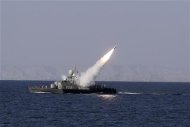MOSCOW (Reuters) - Iran is capable of carrying out military strikes on U.S. interests all around the world if the Islamic Republic is attacked by the United States, Iran's ambassador to Moscow said on Wednesday.
The United States has tried to force Tehran to scrap sensitive nuclear work by imposing sanctions targeting Iran's central bank and giving U.S. banks new powers to freeze Iranian government assets.
Iran's ambassador to Moscow said that the United States would be making a serious mistake, akin to suicide, if it risked a military strike on OPEC's No. 2 oil exporter.
Washington has announced no such plans, but has said a military option is always on the table if Iran cannot be otherwise prevented from developing atomic weapons.
"The Americans know what kind of country Iran is. They are well aware of our people's unity," Iranian ambassador Seyed Mahmoud-Reza Sajjadi told a news conference in Moscow.
"And that's why Iran is fully able to deliver retaliatory strikes on the United States anywhere in the world," he said, speaking through an interpreter.
"Even if it attacks, we have a list of counter actions. (The United States) would be disappointed with their huge mistake."
Iran has increasingly issued threatening statements against the West in recent weeks as tension has increased over its uranium enrichment program, which it moved last month to a mountain bunker better protected from possible air strikes.
Iran says its nuclear program is peaceful while Western powers fear Tehran is trying to build a nuclear bomb.
"The issue of a military attack from America on the Islamic Republic of Iran has been on the agenda for several years," said Sajjadi, adding that Iran would never strike first.
Iran has warned its response to any such strike would be "painful," threatening to target Israel and U.S. bases in the Gulf, along with closing the Strait of Hormuz used by one third of the world's seaborne oil traffic.
Russia, the world's biggest energy producer, opposes further U.N. Security Council sanctions over Tehran's nuclear program and has sharply criticized U.S. and European Union sanctions.
(Writing by Steve Gutterman and Guy Faulconbridge)


